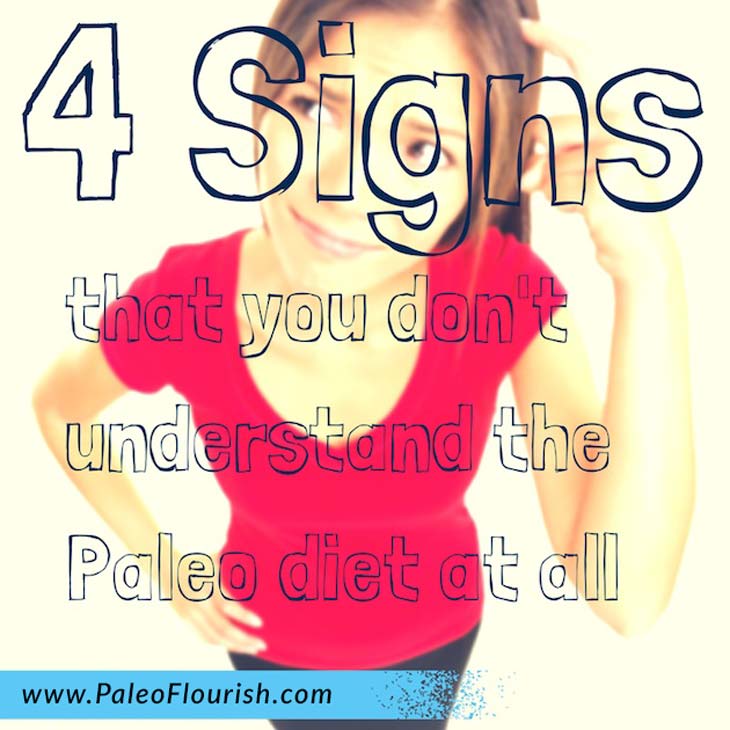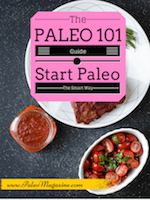4 Signs that You Don’t Understand the Paleo Diet at All

In college, I had a roommate who was vegetarian. Awesome guy, and I think he was vegetarian mostly because he had moral qualms with eating animals.
I’m quite certain that he wasn’t vegetarian for health reasons. Let’s just say that his diet – which consisted mostly of pizza and Little Debbie snacks – didn’t do him any favors.
So you can imagine my surprise years later when I found out that there were people in the world who thought vegetarianism was a healthy way to eat. Clearly they were all crazy and had never met my roommate.
What You Know About the Paleo Diet
All joking aside, my roommate’s diet obviously wasn’t exactly representative of all vegetarians, although I’ve known more than a few who seem to follow that same template.
As of today, I’ve followed a Paleo diet and lifestyle for about 8 or 9 years (it’s been a long time), and one of the things that surprises me most is how many people write about the Paleo diet (both in favor of and against it) without really knowing what it means to be or eat Paleo.
Everyone is entitled to their opinions, but here are 4 facts that will keep you from looking like a complete idiot when you talk to your friends, family, and colleagues about the Paleo diet:
 1. The Paleo Diet is NOT All About Evolution. In fact, it never has been. The people who started the Paleo movement in its modern form (Boyd Eaton and Loren Cordain, namely) are scientists who only ever used historical, anthropological, and evolutionary arguments as starting points.
1. The Paleo Diet is NOT All About Evolution. In fact, it never has been. The people who started the Paleo movement in its modern form (Boyd Eaton and Loren Cordain, namely) are scientists who only ever used historical, anthropological, and evolutionary arguments as starting points.
Sure, we love to look back at what Paleolithic hunter-gatherers ate and how they lived.
But we do this only to develop hypotheses of what may likely be healthy or unhealthy for us.
For instance, we’re pretty sure that nobody in the Paleolithic era ever drank sodas or gorged themselves on potato chips. That doesn’t mean those things are automatically bad for humans, but it’s a good starting point. On the other hand, humans have survived on vegetables, fruits, and animals meats forever, so it’s hard to imagine that those foods are generally harmful.
And once we have these starting points, we can test them with modern science and everything we know about the human body. For instance, we know that excess sugar and excess Omega-6 fats are pretty toxic for humans, so we know that sodas and potato chips are toxic for reasons other than being new.
The irony is that the Paleo diet is more firmly grounded in peer-reviewed science than in any evolutionary story.
Personally, I think that’s a very good thing.
2. There is NO Single Paleo Diet. This should be obvious for many reasons. First of all, humans who lived 500,000 or 1,000,000 years ago ate extremely different foods depending mostly on where they lived in the world. Generally, the closer to the equator a human lived, the more tubers (yams, turnips, etc.) a person ate, whereas living closer to the artic circles meant a diet more reliant on animal products.
As different as these diets were, though, none of them included processed sugars, vegetable oils, or grains or legumes as a staple.
The irony is that no one would ever say that there’s no such thing as a vegetarian just because one vegetarian lives on pizza and doughnuts whereas another vegetarian eats mostly broccoli and asparagus.
The Paleo Diet is a diet that focuses on nutritional density (maximizing vitamins, minerals, and macronutrients) and minimizing toxins (gluten, excess processed sugar, excess polyunsaturated fats, etc.).
Personally, I eat rice a couple times per month, even though pretty much no human ate rice as a significant portion of their diet prior to about 10,000 years ago. Am I still Paleo? Of course. White rice is very low in toxins, and although it’s also low in nutrients, I don’t eat it often enough to crow out other more nutrient-dense foods.
3. Paleo Means Eating Only Lean Meats. Saying that Paleo is only lean meats is like saying Bill Clinton is the president of the United States. It was true at some point, but saying this today will make you look like you’ve been asleep for the past 15 years.
When Loren Cordain first came out with his book, he suggested that humans were healthier when they restricted themselves to lean meats. But, like any good scientist, he kept doing research and figured out that he was not correct about that point (although he got a ton of other stuff right). At least 8 years ago, even Cordain publicly changed his opinion, and there is pretty much nobody in the Paleo movement who believes that fat is anything but highly beneficial, so long as it’s largely saturated or mono-unsaturated.
One of the biggest trends in Paleo right now is the move toward consuming more organ meats, which are usually a fair amount fattier than muscle meats (and consequently higher in vitamins like A, D, E, and K). It’s an awesome trend, even though I don’t personally love organ meats.
Point is, though, that many writers and bloggers fail to keep up. Fats are highly valued in Paleo diets.
4. Dairy is Completely Off-Limits. I have a personal opinion that anyone starting Paleo should abandon all dairy for a while. It’s hard to know how your body reacts to dairy until you’ve taken it out of your life for an extended time.
However, many people tolerate dairy perfectly well, particularly raw and fermented dairy products. And given that dairy is fairly nutrient-dense, why would these people abandon dairy forever?
They wouldn’t, of course, and nobody in the Paleo world thinks they should. If you avoid pasteurized and homogenized dairy products, then dairy is highly nutritious and fairly low in toxins.
Like quite a few other things in Paleo, there’s a lot of individual variance. What that means is that if you’ve properly healed your body from years of subjecting it to processed junk food, then it eventually becomes possible to tell whether or not your body reacts well to things like dairy. (Note that this is not just about lactose intolerance, in case you’re wondering.)
The bigger point here is that certain people have issues even with eating foods like tomatoes, almonds, or sweet potatoes, which most of us recognize as fairly non-toxic and reasonably nutrient-dense. Dairy is one of these foods, and pretty much everyone who is Paleo is going to have a slightly different experience.
Why All This Matters
There is a part of me that just wants to set the record straight.
But there are better reasons to get things right, whether you support Paleo or not.
First and foremost, focusing on aspects of Paleo that just aren’t the case doesn’t advance our knowledge at all. There is still plenty left to learn, and it doesn’t help to rehash issues that are already resolved. For instance, I’ve recently seen articles arguing that the Paleo diet is silly because different hunter-gatherers had very different diets. That’s not a useful critique because that’s something we not only acknowledge but embrace. Nobody thinks that there is a singular way of eating, but we’re pretty darn sure that there are things to avoid.
Perhaps more importantly, nutrition and health has been confusing for too long.
Nobody has all the answers, and we probably never will, but we know a lot more today than we did 40 or even 4 years ago. Most people don’t have the time to keep up with every new advance in science and nutrition, but we should at least try to get the big stuff right.
Images: Copyright (c) Ariwasabi from Fotolia and rodjulian from Fotolia

